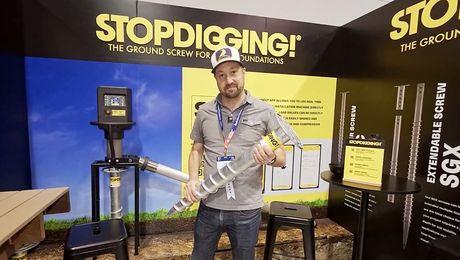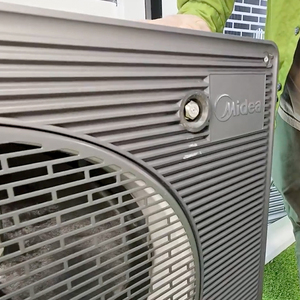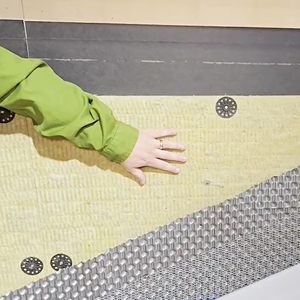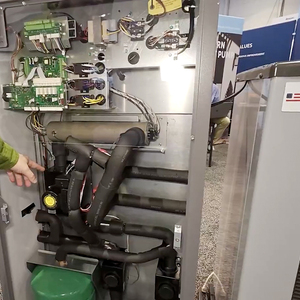We are starting to plan an addition/remodel and have determined to replace our OLD HVAC systems at the same time. Currently we have oil hotair heat and standard AC. In August ’07 I bought our oil for the 07/08 heating season @ $2.45, and am quite sure that I won’t be able do buy at that price in August ’08!
I want to take a hard look at geothermal, and have found no articles in FHB later than 2000 (? This is a green publication?!?!?). I’m hoping to get some input from Breaktime readers.
Here are some bits of info which may be useful: a) This would be a closed loop system. b) Wells or a well would need drilling. Our soil is so stony as to defy description, and attempting a trenched system would be insane. ( Our neighbor’s basement excavation was blasted before dozing.) c) Our HVAC guy says we will want 3.5 tons, which is smaller than our current system. d) Pennsylvania’s deregulation electric rate cap is gone, and we already know from our utility that electric is going up at least 20% next year. e) I would consider adding a domestic hot water preheater to a geothermal system (See electric rates, above). f) We used apx 600 gallons of oil this season, which was mild.
Any opinions on the cost recovery time for geo vs a hybrid system? Or how much cheaper geo might be to operate than a hybrid (oil/electric)?



















Replies
Look into DX (direct exchange) if you can find a local installer.
Love to but need help: Is DX a technology? Or a brand?
"Direct exchange". No water wells or water pumping.
http://www.ecrtech.com/content/
All geothermal installers in my area are well drillers with all the equipment. They wont do DX.
Thank you! This is very interesting!
You can start here.
http://forums.taunton.com/n/mb/message.asp?webtag=tp-breaktime&msg=102981.1
"Pennsylvania's deregulation electric rate cap is gone, and we already know from our utility that electric is going up at least 20% next year"
That means nothing..
Is your current electric rates 5 c/kWh or 25 c/kWh?
And does the electric company offer an speical "deals" on going with ground source or heat heat systems. And the type of deals, if any vary a lot. Can be cash rebate, reduced rates, off peak rates, affect all power, separate metering for heat, etc.
"a) This would be a closed loop system. b) Wells or a well would need drilling. Our soil is so stony as to defy description, and attempting a trenched system would be insane. ( Our neighbor's basement excavation was blasted before dozing.)"
What are you going to "close loop" it into?
It either has to go horizontally into trenches or vertically into drilled holes.
.
A-holes. Hey every group has to have one. And I have been elected to be the one. I should make that my tagline.
Mine will go, minimum, from 10 to 12 cents, with further increasese definitely coming.
Self evident: Well(s). Trenching here is a nightmare.
I'm spending my first winter with our Geothermal
system.
Just wanted to mention my one gripe.
It's a forced air system and the air is not as hot
as a conventional system. It heats the house just fine,
you just don't want it blowing on you.
I never hear it mentioned so I thought I'd
speak up. Other then that it has been blissfully boring.
Set the thermostat and forget about it.
It seams pretty efficient but it's hard to
tell exactly.
We just moved in and the shell needs updating.
Plus the house came with a 400 gallon hot tub,
lord knows how much that thing is costing us.
The previous owners left us their records tho.
a family of five ( with the hot tub) and all
utilities are electric-$2000.00 a year.
For a 2500sf house with crappy insulation
that pretty good.
Henley
I have customer with geothermal (trench in the yard).
He got a big rebate from REC for the install.
He loves it and loves the energy savings. This guy is tight as bark.
But the fan runs constantly. Always 70 degree air but always moving.
Rich
Edited 4/6/2008 9:25 am ET by cargin
It seams strange to have such a fancy heat
system terminate in forced air.
If I was setting it up ,I'd spend the extra to
avoid the fans and ductwork. Ours doesn't seam to run that much more then
other forced air and I'd probably notice with
cooler air it kicks out.
So do you ever use air conditioning? Without ducts? How?
Good point,
This is the first house I've ever lived in with Central
Air.
I guess I never had- never needed it.
Granted I live in Upstate NY
Global warming.
Oh you didn't hear?
They cancelled it, something about
bipartisan bickering or something.
Good thing to my cross country sky's are getting rusty.
I put in geothermal two years ago. I was also doing a major remodel so it's hard to compare. My house has not been at all tight. (It's getting better, but I'm only one person!)My unit does both forced air and hydronics. I'm only just setting up the hydronic portion. Yes, it runs alot. Yes, the air is cool. It sometimes struggles to keep up when it's 10 below and windy.I'm sure it's saving me money. I'd expect payback in ten years. And the loop field was bored, not trenched. I can't imagine trenching.
Ours came with the house so I'm still
learning the future options available.
I knew you could get hydronic, but wasn't aware
one machine could run both. What company did
you
go with?
The best part of our system is it runs off a pond. I was
told you get better heat transfer that way, but whatever we
have a nice pond out back.
How is your system setup?I live on a 100 acre lake and would like to use that as a source. But I hve never seen any details about how to do this. I am concerned about the water lines freezing..
.
A-holes. Hey every group has to have one. And I have been elected to be the one. I should make that my tagline.
First off I'm no expert (at all).
It's a closed loop system with some sort of Antifreeze you never
have to change. Yeah like that's possible.
Line out and line in with separate (small) pumps in the basement.
Run under ground to the pond.
A series of coils sitting on the bottom.
That's it really.
We have extra coils along side the pond for paranoia's sake.
The requirements for this system here in central new york
are-
1/4 acre pond or larger
min. 8' deep. That is the size and depth of our pond and we didn't have any
problems this winter.
There is a backup heater coil in the heat pump in case the pond
water goes below freezing. That would most likely not be cheap
to run tho.
The lines are buried so they wont freeze.
There is a trick tho.
You install coils in the pond first.Then run the lines
part way to they house. Then back fill first section, before
you dig the rest of the run or you can empty the pond into your
basement.
ThanksThe depth is the problem. I would problably have to go out 40 ft to 8 ft depth. And then I am in way of boats and the ocasonal dredge..
.
A-holes. Hey every group has to have one. And I have been elected to be the one. I should make that my tagline.
Ponds are excellent because then your loopfield costs are cut.My unit (both forced air and hydronic in one box) is a synergy unit from Water Furnace.
"Ours doesn't seam to run that much more then
other forced air and I'd probably notice with
cooler air it kicks out."That's a good point. People who've never lived with a forced-air heat pump don't realize that in the Winter, 72F air blowing across a room feels like a cool draft. The thermostat reads the correct set-point temperature but moving air always feels cooler on exposed skin.I never got used to it and in our new house we have baseboard hot water heat.
Hi,
It sounds like one of your objectives is a "green" solution?
If so, a geothermal heat pump may not be your best bet. The GSHP's are very efficient -- maybe 350% efficient. But, the US electric grid is very inefficient -- maybe 30 to 35%, and half of the US grid power comes from coal, which is a very high carbon fuel.
When you go through the math for the heating side, a 90% efficient gas furnace or boiler produces about the same amount of CO2 as a GSHP powered from the US electric grid using a mix of coal and other fuels.
Not sure how it works out for an oil furnace.
You might think instead about spending the extra GSHP money on envelope improvements, infiltration sealing, window improvements, solar heating or water heating, ...
These all save energy, dollars, AND CO2.
Gary
want to take a hard look at geothermal, and have found no articles in FHB later than 2000 (? This is a green publication?
One thing to do is to search for "ground source" not "geothermal" while looking for source information. You then may want to sort that for "air to air" and "air to water" for the two broad categories of ground-source heat pump systems.
In the most exact sense, "geothermal" really only refers to those places with strong heat sources near the Earth's surface, such as thouse found around hot springs and the like. It's a term-of-art more typical of power generation than of house heating and cooling.
Now, as to the "green-ness" of it, that varies, and quite a bit, both protagonists and antagonists, both. If you are a national publication that leaves only a tiny razor's edge to travel without swaying into errors of ommission and of commission, depending upon the region. Sinking an air-to-air exchange well in Omaha a different proposition than in Baton Rouge, LA (and a "dry" well very problematic in Red Stick, too).
It's quite complicated. Spend extra to superinsulate to save money, but spend money bringing in fresh air. Select a system based on present day rebates and incentives only works as long as they last. That level of complexity will often send me to a mechanical engineer, and even stump him every so often.
"One thing to do is to search for "ground source" not "geothermal" while looking for source information. You then may want to sort that for "air to air" and "air to water" for the two broad categories of ground-source heat pump systems."For ground source unless it is the direct contact with the freon line in the ground then it is either Water to air or Water to water..
.
A-holes. Hey every group has to have one. And I have been elected to be the one. I should make that my tagline.
I've had a goethermal HVAC in for the last 14 years.........
I would do it again....no problem. Mine is a Waterfurnace, w/ 2000' of pipe run in trenches 6'0" deep. Most of the installations in the midwest use the deep well system but I've had no problem with the trench system (if you have the land)
What made it sweet was the utility incentives.....2.9% @ 20 years. That deal don't exist no more (I wonder why?) but your electric utility may have a program.
But you have to ask. And it doesn't hurt to tell them your gonna go all electric, and will need a new service, 400 amp min, buried from their pole in, new pole...with a new 50kw kettle because you intend to plug in new stationary shop tools.........you know, for your expanding business.......
Like I said, it don't hurt to ask.......
Good luck with you project!
I found this site helpfull. http://www.warmair.net/html/fuel_cost_comparisons.htm Just put in your info and then see what each system costs around you. I have a geo system that has heated my house for 3 winters (with raident floor) for less then 300 dollars and cooled it for 3 summers (with fan coils) for less then 100 dollars but that has more to do with how I built the house then the what I heat with.